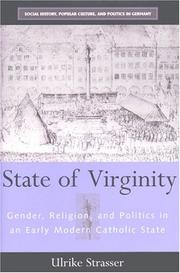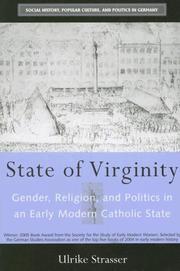| Listing 1 - 10 of 14 | << page >> |
Sort by
|

ISBN: 0472113518 Year: 2004 Volume: *19 Publisher: Ann Arbor, Mich. University of Michigan Press
Abstract | Keywords | Export | Availability | Bookmark
 Loading...
Loading...Choose an application
- Reference Manager
- EndNote
- RefWorks (Direct export to RefWorks)
Christian church history --- History of Germany and Austria --- Ethics of family. Ethics of sexuality --- anno 1600-1699 --- anno 1700-1799 --- Christianity and politics --- Marriage --- Women in the Catholic Church --- Catholic women --- Eglise catholique --- Mariage --- Femmes dans l'Eglise catholique --- Christianisme et politique --- Femmes catholiques --- Catholic Church --- History. --- Religious aspects --- History of doctrines. --- Social conditions. --- Aspect politique --- Histoire --- Aspect religieux --- Histoire des doctrines --- Conditions sociales --- Munich (Germany) --- Munich (Allemagne) --- Politics and government. --- Church history. --- Politique et gouvernement --- Histoire religieuse
Book
ISBN: 9048537525 9789462986305 9789048537525 9462986304 Year: 2020 Publisher: Amsterdam Amsterdam University Press
Abstract | Keywords | Export | Availability | Bookmark
 Loading...
Loading...Choose an application
- Reference Manager
- EndNote
- RefWorks (Direct export to RefWorks)
How did gender shape the expanding Jesuit enterprise in the early modern world? What did it take to become a missionary man? And how did missionary masculinity align itself with the European colonial project? This book highlights the central importance of male affective ties and masculine mimesis in the formation of the Jesuit missions, as well as the significance of patriarchal dynamics. Focussing on previously neglected German figures, Strasser shows how stories of exemplary male behavior circulated across national boundaries, directing the hearts and feet of men throughout Europe towards Jesuit missions in faraway lands. The sixteenth-century Iberian exemplars of Ignatius of Loyola and Francis Xavier, disseminated in print and visual media, inspired late seventeenth-century Jesuits from German-speaking lands to bring Catholicism and European gender norms to the Spanish-controlled Pacific. As Strasser demonstrates, the age of global missions hinged on the reproduction of missionary manhood in print and real life.
Book
Year: 1990 Publisher: Kalamazoo, Mich. Western Michigan University
Abstract | Keywords | Export | Availability | Bookmark
 Loading...
Loading...Choose an application
- Reference Manager
- EndNote
- RefWorks (Direct export to RefWorks)
Christina the Astonishing --- Margaret of Ypres --- Lutgardis [s.]

ISBN: 9780472032150 0472032151 Year: 2007 Publisher: Ann Arbor University of Michigan Press
Abstract | Keywords | Export | Availability | Bookmark
 Loading...
Loading...Choose an application
- Reference Manager
- EndNote
- RefWorks (Direct export to RefWorks)
Book
Year: 2020 Publisher: Amsterdam : Amsterdam University Press,
Abstract | Keywords | Export | Availability | Bookmark
 Loading...
Loading...Choose an application
- Reference Manager
- EndNote
- RefWorks (Direct export to RefWorks)
How did gender shape the expanding Jesuit enterprise in the early modern world? What did it take to become a missionary man? And how did missionary masculinity align itself with the European colonial project? This book highlights the central importance of male affective ties and masculine mimesis in the formation of the Jesuit missions, as well as the significance of patriarchal dynamics. Focussing on previously neglected German figures, Strasser shows how stories of exemplary male behavior circulated across national boundaries, directing the hearts and feet of men throughout Europe towards Jesuit missions in faraway lands. The sixteenth-century Iberian exemplars of Ignatius of Loyola and Francis Xavier, disseminated in print and visual media, inspired late seventeenth-century Jesuits from German-speaking lands to bring Catholicism and European gender norms to the Spanish-controlled Pacific. As Strasser demonstrates, the age of global missions hinged on the reproduction of missionary manhood in print and real life.
Book
Year: 2020 Publisher: Amsterdam : Amsterdam University Press,
Abstract | Keywords | Export | Availability | Bookmark
 Loading...
Loading...Choose an application
- Reference Manager
- EndNote
- RefWorks (Direct export to RefWorks)
How did gender shape the expanding Jesuit enterprise in the early modern world? What did it take to become a missionary man? And how did missionary masculinity align itself with the European colonial project? This book highlights the central importance of male affective ties and masculine mimesis in the formation of the Jesuit missions, as well as the significance of patriarchal dynamics. Focussing on previously neglected German figures, Strasser shows how stories of exemplary male behavior circulated across national boundaries, directing the hearts and feet of men throughout Europe towards Jesuit missions in faraway lands. The sixteenth-century Iberian exemplars of Ignatius of Loyola and Francis Xavier, disseminated in print and visual media, inspired late seventeenth-century Jesuits from German-speaking lands to bring Catholicism and European gender norms to the Spanish-controlled Pacific. As Strasser demonstrates, the age of global missions hinged on the reproduction of missionary manhood in print and real life.
Book
Year: 2020 Publisher: Amsterdam : Amsterdam University Press,
Abstract | Keywords | Export | Availability | Bookmark
 Loading...
Loading...Choose an application
- Reference Manager
- EndNote
- RefWorks (Direct export to RefWorks)
How did gender shape the expanding Jesuit enterprise in the early modern world? What did it take to become a missionary man? And how did missionary masculinity align itself with the European colonial project? This book highlights the central importance of male affective ties and masculine mimesis in the formation of the Jesuit missions, as well as the significance of patriarchal dynamics. Focussing on previously neglected German figures, Strasser shows how stories of exemplary male behavior circulated across national boundaries, directing the hearts and feet of men throughout Europe towards Jesuit missions in faraway lands. The sixteenth-century Iberian exemplars of Ignatius of Loyola and Francis Xavier, disseminated in print and visual media, inspired late seventeenth-century Jesuits from German-speaking lands to bring Catholicism and European gender norms to the Spanish-controlled Pacific. As Strasser demonstrates, the age of global missions hinged on the reproduction of missionary manhood in print and real life.
Book
ISBN: 3648134299 3648134280 Year: 2020 Publisher: Freiburg : Haufe Lexware Verlag,
Abstract | Keywords | Export | Availability | Bookmark
 Loading...
Loading...Choose an application
- Reference Manager
- EndNote
- RefWorks (Direct export to RefWorks)
Long description: Während die Generation Y mit ihrer Arbeitsethik und ihren Ansprüchen an Kommunikation, Feedbackkultur und Work-Life-Balance Babyboomer und Generation X herausfordern, kommt bereits die Generation Z ins Unternehmen: digital aufgewachsen, flexibel und gut vernetzt. Die Einstellungen zueinander sind dabei oftmals von Vorurteilen und Labels geprägt. Worauf müssen Arbeitgeber sich einstellen und wie gelingt gute Zusammenarbeit?Die Autorinnen stellen die vier Generationen mit Blick auf ihre Errungenschaften in Kommunikation, Zusammenarbeit, Personal- und Organisationsentwicklung vor. Sie geben Empfehlungen zur Überwindung des Generation Gap und stellen Team-Building-Tools und Workshop-Ideen vor, die eine konstruktive und produktive Zusammenarbeit fördern.InhaltGenerationen am Arbeitsplatz: Prägung und WerteArbeitgebermarketing, interne Kommunikation, Open Space und HomeofficeVertrauen und Feedback-Kultur, Leistung und Performance, Mentoren und Coaches, ErreichbarkeitDas agile Unternehmen und die Persönlichkeit der Führungskraft: Intrapreneurship als KernkompetenzWie werden wir morgen zusammenarbeiten? Biographical note: Ulrike Straßer Dr. Ulrike C. Straßer ist Unternehmensberaterin und Executive Coach. Mit ihrem Start Up aboutGenZ fördert sie die Überwindung des Generation Gaps. Isabell Lütkehaus Dr. Isabell Lütkehaus ist selbstständige Executive Coach und Supervisorin (DGSv), Rechtsanwältin und Mediatorin (BM, BAFM) sowie Trainerin und Autorin.
Personalentwicklung --- Generationen --- Work-Life-Balance --- Generation Y --- Generation X --- Babyboomer --- Generation Z --- Generation Gap --- Cross Generational Intelligence --- Straßer --- Lütkehaus
Book
ISBN: 9781442630376 144263037X Year: 2017 Publisher: Toronto, Ont. University of Toronto Press
Abstract | Keywords | Export | Availability | Bookmark
 Loading...
Loading...Choose an application
- Reference Manager
- EndNote
- RefWorks (Direct export to RefWorks)
"Contrary to the historiographical commonplace "no Reformation without print" Cultures of Communication examines media in the early modern world through the lens of the period's religious history. Looking beyond the emergence of print, this collection of ground-breaking essays highlights the pivotal role of theology in the formation of the early modern cultures of communication. The authors assembled here urge us to understand the Reformation as a response to the perceived crisis of religious communication in late medieval Europe. In addition, they explore the novel demands placed on European media ecology by the acceleration and intensification of global interconnectedness in the early modern period. As the Christian evangelizing impulse began to propel growing numbers of Europeans outward to the Americas and Asia, theories and practices of religious communication had to be reformed to accommodate an array of new communicative constellations across distances, languages, cultures."--
Intercultural communication --- Communication --- Mass media --- Theology --- Reformation. --- 284 --- Cross-cultural communication --- Culture --- Cross-cultural orientation --- Cultural competence --- Multilingual communication --- Technical assistance --- Protestant Reformation --- Reformation --- Church history --- Counter-Reformation --- Protestantism --- Christian theology --- Theology, Christian --- Christianity --- Religion --- Communication (Theology) --- 284 Protestantisme. Protestantse sekten --- 284 Protestantisme. Sectes protestantes --- Protestantisme. Protestantse sekten --- Protestantisme. Sectes protestantes --- History --- Religious aspects --- Christianity. --- Anthropological aspects --- History of civilization --- History of Europe --- anno 1500-1599 --- Mass communication --- Media, Mass --- Media, The --- Communication, Primitive --- Sociology --- Religious aspects&delete&

ISBN: 0415912989 0415912970 Year: 1996 Publisher: New York Routledge
Abstract | Keywords | Export | Availability | Bookmark
 Loading...
Loading...Choose an application
- Reference Manager
- EndNote
- RefWorks (Direct export to RefWorks)
Through twenty engaging essays exploring cultures ranging from ancient Judaic civilization to contemporary Brazil, Gender, Kinship and Power places important contemporary issues related to kinship--such as parental responsibility and female-headed households--in their proper comparative and historical framework. (Routledge)
Families --- Kinship --- Sex role --- Familles --- Parenté --- Rôle selon le sexe --- Cross-cultural studies --- Etudes transculturelles --- Parenté --- Rôle selon le sexe --- History --- Sociology of culture --- Sociology of the family. Sociology of sexuality --- Asia --- America --- Europe --- Family --- Kinship - Cross-cultural studies. --- Ethnology --- Clans --- Consanguinity --- Kin recognition --- Cross-cultural studies. --- Gender --- Multiculturalism --- Book
| Listing 1 - 10 of 14 | << page >> |
Sort by
|

 Search
Search Feedback
Feedback About UniCat
About UniCat  Help
Help News
News